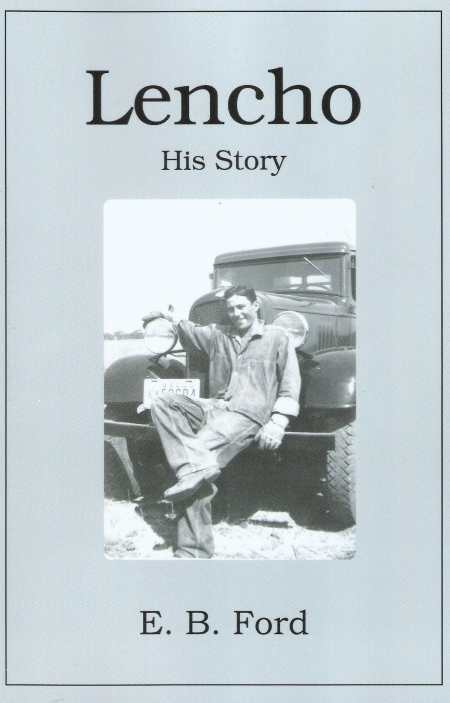Lencho
His Story
An illegal immigrant from Mexico, Lorenzo Anzaldua, nicknamed Lencho, arrived in Texas with his father and three brothers in 1920. A thoroughly self-made man with no shame about his flaws and justifiable pride in his accomplishments, Lencho, in his old age, stated that, “You don’t need nobody to tell you to do this or do that. You just set yourself a goal … how you want to be. Not tomorrow, but in five or ten years. And then you start doing what you need to do to get there.”
E. B. Ford is Lencho’s daughter. To tell his story, she has taken reminiscences and incidents from his long and colorful life and elaborated on them to compose what could be called a work of creative biography. She has invented a college student named Heather Rodriguez to “record” Lencho’s words while he is lingering in a nursing home. Heather, the reader is told, has a class assignment to talk to an elderly person, and thus begins a fictional relationship that forms the basis for telling Lencho’s life story.
Each chapter involves a visit from Heather, who talks with the still-handsome but aging Lencho as he struggles with poor health. Each present-day scene is linked to a flashback to Lencho’s past and told from the point of view of one of the characters from his youth. We see the schoolboy Lencho from the perspective of a young teacher in his segregated school. Miss Russell senses that Lorenzo, who is being raised by his widowed father, is a smart boy; in sympathy for his poverty and his difficult family situation, she makes sure that he has at least one good pair of shoes.
Lencho’s recollections include enduring racial prejudice in the Texas of his youth. He laughs at the “cowboy” movies depicting white, well-dressed men herding cattle, when he knew that it was poor Mexican vaqueros who did the real work. Lencho married his childhood sweetheart and raised three children. Toward the end of the book, he is felled by a massive stroke, his memories become unreliable and Heather’s project comes to an end. Lencho believes he is being “visited” by his wife, not realizing that she is dead.
Ford’s book is cleverly devised, using the college student’s assignment to link her father’s last days with his recollections of past adventures. It contains a satisfying mix of narrative and dialogue, a realistic peppering of common Spanish conversational phrases, and an unvarnished glimpse of Mexican-American cultural history.
Though the unusual mix of fact and fiction in this book might bother some readers, the indomitable personality of Lencho is what stands out. He is a strong, stubborn man who labored extremely hard to build a life for himself and his family in a less than hospitable land. Americans of Hispanic origin may be especially appreciative of Ford’s efforts to capture the cherished memories of her father—his strong work ethic and often hilarious escapades, romances, and brushes with the law, which are painted against a backdrop of hardship, poverty, and racial prejudice.
Reviewed by
Barbara Bamberger Scott
Disclosure: This article is not an endorsement, but a review. The publisher of this book provided free copies of the book and paid a small fee to have their book reviewed by a professional reviewer. Foreword Reviews and Clarion Reviews make no guarantee that the publisher will receive a positive review. Foreword Magazine, Inc. is disclosing this in accordance with the Federal Trade Commission’s 16 CFR, Part 255.

